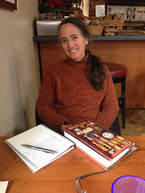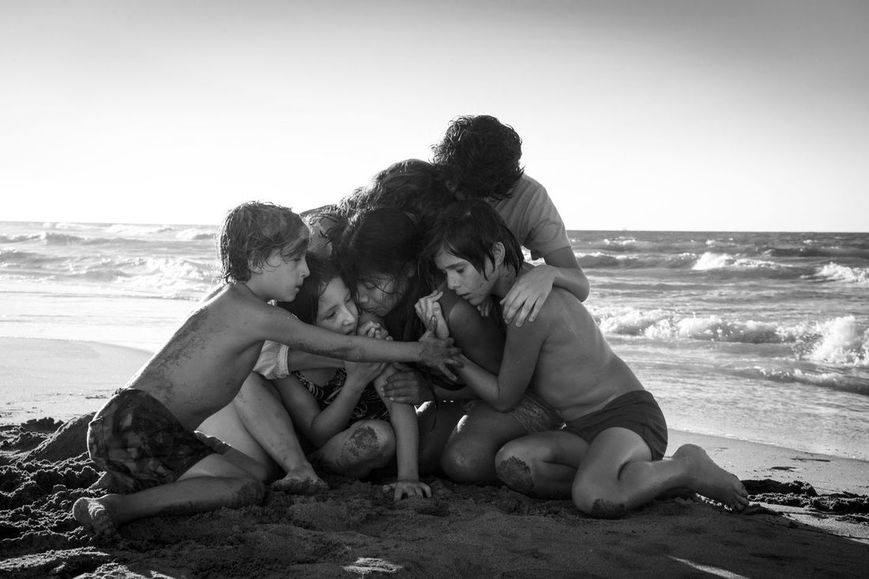|
Carlos Somonte, Netflix Alfonso Cuarón’s Roma: What You Notice When You Look [Spoiler alert—This review covers all events of the film.] What a rich pleasure Alfonso Cuarón’s Netflix film Roma is! The film is shot in black and white and is named after Colonia Roma in Mexico City. The slow opening credits of a patio being washed down prepare us for the approaching concentrated and deeply-nuanced viewing experience. (I almost gave up on the film during the lengthy opening credits and am so grateful I did not. If watching mop water slosh towards a drain bores you to the point of annoyance, fast forward through them.) The jet plane that appears overhead as the opening shot pans back and out reappears two times more, so watch for it. The film follows a middle-class Mexican family—Sofia, Antonio, their four children, and Teresa, Sofia’s mom—and their two Oaxacan, Mixtec-speaking, live-in housekeepers, Adela and Cleo, focusing especially on Cleo. The drama explores multiple tensions—well-off / poor, male / female, constraint / liberation, love / emotional absence. The family works Adela and Cleo hard from dawn to dusk. The movie begins by following Cleo through her tasks of a single day, from cleaning dog urine and feces from the patio and continuing through cooking, cleaning, laundry, fetching children from school, tucking them in at night, and even ironing after the family has gone to sleep. The four young children in the family make Cleo’s job seem especially bootless. We’ve just seen her working non-stop, yet hear the father, Antonio, who typically returns late at night after the children have undone Cleo’s hard work, complain to his wife about what a mess the house is. (Tellingly, Sofia doesn’t agree with him, perhaps knowing better than he does what Cleo is up against.) The movie creates a tension between the freedom of the street and the claustrophobia of the house. The family dog can only stay in the patio / garage. He bounces up and down behind the glass of the door whenever anyone passes or returns home and tries throughout the film to slip outside. The family always brings him back, lovingly to be sure, but inexorably. One feels the same eagerness in Cleo and Adela to escape the confines of the house. Late at night, after the young women have returned to their servants’ quarters, they mention feeling spied on, with Sofia chiding them if they leave the lights on at night. They exercise—charmingly only three toe-touches and three-sit-ups—by candlelight. When Adela and Cleo are sent on any outside errand, and especially on their day off, when they dash pell-mell down and across streets even at peril of being hit by cars. The young women rush to fill this brief free time, going to a restaurant, and on separate dates—Cleo to a hotel for a sexual tryst, which results in her becoming pregnant. She has so little chance to do, try, and experience life in a more measured way. When the family later spends New Year’s at a country hacienda, Cleo revels aloud at being outside in a place with a horizon and with the sounds and smells of the natural world, not the same as, but evoking, her native Oaxaca. We see the class strain in the casual entitlement of the family, how the children think nothing of dropping their wet coats on the floor when they enter the house for Cleo to pick up. When Cleo, clearing away the family’s snack dishes, is swept up in a comedy show that the family is watching one evening on the TV and lingers for a moment to laugh alongside them, she is immediately sent to bring the father some tea. Cleo and Adela carry heavy suitcases to and from the car and baskets of laundry up two flights of stairs to the roof where they wash seven people’s clothes by hand. On New Year’s Eve, when the family visits an uncle’s hacienda, we get a second glimpse of this “upstairs / downstairs” divide—the patrons in fine clothes drinking champagne from fluted glasses, while the help celebrates downstairs in work clothes, drinking pulque and mezcal from clay mugs. When a fire breaks out and everyone rushes to “help,” only the workers and children pour water on the blaze. The family laughs and continues to drink and sing. Although he, himself, is poor, the final word that Cleo’s jilting lover, Fermin, throws at her is “servant.” And yet there is also genuine affection between Cleo and the family she serves. The children respond to her as warmly they would to their mom. She sings Mixtec lullabies to them. She watches their squabbles, attuned to when the tension between the kids threatens to break out into something dangerous. Due to her social position, she cannot always intervene effectively, but she is more alert to the nuances of the family than the grandmother or the absent / distracted parents are. She tries her best to console the weaker members. The children initiate physical contact with her and tell her that they love her, without the sense of duty that accompanies similar gestures to their parents—especially their absent father, Antonio. When Cleo anxiously confesses her pregnancy to Sofia, worried that she will be dismissed, instead Sofia responds with compassion, telling her that of course she will be well-taken care of, and indeed Cleo is brought to see the family doctor immediately to check on her pregnancy. The relationships depicted between men and women are painful. Antonio is having an affair with a much younger woman as he hides behind the fiction that he is working in Quebec, which his wife soon realizes. Our first introduction to Antonio is of his hands on the wheel of his car, manipulating it just so, forward and back, to fit it into the cramped space of his garage, while at the same time smoking a cigarette and fiddling with the classical music on the radio. We can tell that he likes his world to be just so. Having given up on his marriage, he never turns his body towards Sofia, only away, his affections and attention elsewhere. Fermin, Cleo’s impregnator, spends part of their first tryst demonstrating a karate kata nude in their hotel room. His body is lean and hard. His nakedness is neither affectionate nor vulnerable, but rather menacing, as if to say, “Training is my world, anything that interferes with it will be smacked out of the way. Even naked, I could destroy you.” His body is not an instrument of love, but of violence. (It was interesting, too, that this movie chose to have full-frontal male nudity but no female nudity, which I welcomed.) This motif of barely restrained male violence recurs when Cleo tracks Fermin down later on the training field near the slum where he lives. After she approaches him, he again whips his training pole around her pregnant and vulnerable body, ki-i-ing and telling her that if she tracks him down again, he will beat her senseless. (It’s no surprise that he is recruited into a paramilitary gang, or that the last time we see him, he is menacing Cleo and Teresa with a gun during a riot which she is swept up in while shopping for a crib.) At the hacienda, we watch Cleo inadvertently witness a drunken relative hitting on Sofia. When Sofia rejects his advances, we fear molestation, but he staggers away, commenting that she isn’t that attractive anyway. Family practices, too, prepare the children for their gendered roles. The mother askes that Cleo not give her daughter dessert so she doesn’t get fat, yet the boys are allowed to eat freely. We watch the oldest son’s rage and cruelty with concern, as we sense him growing into damaged manhood. Fermin’s outdoor martial arts training scene is also key in that it contains the second airplane sighting and a metaphor for Cleo’s function in the family / movie. Professor Zovek, a guru of sorts, comes to give a pep talk to the male trainees. They, and the watching crowd, expect something mind-blowing. Instead, he blindfolds himself and stands in tree pose, immobile. When everyone becomes restless and skeptical, he challenges them to shut their eyes and try to do the same. The camera pans over a field of wobbling, falling people—except for Cleo, who stands in perfect immobility, pregnant, but deeply-rooted. Despite the various traumas and uncertainties that she endures, we feel a calm, strength in her. Sadly, or luckily, we aren’t fully clear which, Cleo loses her baby. Her water breaks when she is crib-hunting during a demonstration that becomes a riot. There is no escaping the ensuing traffic jam, and by the time she reaches the hospital, her baby has aspirated meconium and is born dead. She is plunged into a paralyzing depression that only lifts after she goes on a trip with Sofia and the children to the beach so that Antonio can remove his possessions from the family home without the children present. Sofia, never the most attentive parent, decides to go and check her tires before they return to D.F. the following morning, leaving Cleo, who doesn’t swim, alone with the children at the beach. Of course, the unruly children venture out too far. Cleo puts herself at great risk to wade out and gather them back. The mother returns just as she hauls them dripping onto the sand. As everyone embraces in relief, Cleo bursts into tears and confesses her guilt at not having wanted her baby. Unstated is her fear that her rejection of her pregnancy is why the baby died. She is held tightly by the family in a huge, forgiving, and reaffirming hug. In the closing scene of the movie, Cleo’s spirits seem restored as the family enters into the “new adventure” of life post-Antonio, with Sofia taking on different work, and all of the family members inhabiting other rooms than they had lived in before they left for the trip. The movie closes with the same airplane crossing the city skyline. What does the plane symbolize? Destiny? Life itself, moving quickly past? The social changes of modernity? The youngest son, we sense, is the author / director of the film, an old soul even as a child, speaking to Cleo of his dreams, in which he is always a grown up, navigating his way through hazards. The movie ends much more happily than I supposed. Upon learning that Antonio was leaving the family, I feared that Sofia wouldn’t have the resources to keep Adela and Cleo on and that she would have to return to her village a “burden” or a “failure.” I feared that Fermin would shoot Cleo, that Cleo would drown saving the children, or that one of the children would drown. But the movie avoided melodrama—its suffering was life-sized and stemmed from believable sources. Do not worry that I have exhausted the insights to be gained from this deeply satisfying film. Each detail seems carefully chosen to bring the time period and this particular family’s experiences to life. I look forward to noticing more and to plunging deeper into Cuarón’s vision in a second viewing.  Devon Balwit teaches in Portland, OR. She has six chapbooks and two collections out or forthcoming, among them: The Bow Must Bear the Brunt(Red Flag Poetry); We are Procession, Seismograph (Nixes Mate Books), and Motes at Play in the Halls of Light (Kelsay Books). Her individual poems can be found in The Cincinnati Review, The Carolina Quarterly, Fifth Wednesday, the Aeolian Harp Folio, Red Earth Review, The Fourth River, The Free State Review,Rattle, Red Paint Hil, The Inflectionist Review, and more.
0 Comments
Leave a Reply. |
AuthorWrite something about yourself. No need to be fancy, just an overview. Archives
April 2024
Categories |

 RSS Feed
RSS Feed
